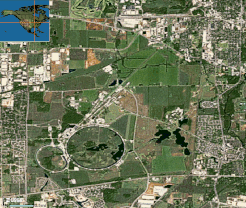 A satellite view of Fermilab. The two circular structures are the Main Injector Ring (smaller) and Tevatron (larger). | |
| Established | November 21, 1967 (as National Accelerator Laboratory) |
|---|---|
| Research type | Accelerator physics |
| Budget | $739 million (2024)[1] |
Field of research | Accelerator physics |
| Director | Lia Merminga |
| Address | P.O. Box 500 |
| Location | Winfield Township, DuPage County, Illinois, United States 41°49′55″N 88°15′26″W / 41.83194°N 88.25722°W |
| Nickname | Fermilab |
| Affiliations | U.S. Department of Energy University of Chicago Universities Research Association |
| Leon Max Lederman | |
| Website | fnal |
| Map | |
Fermi National Accelerator Laboratory (Fermilab), located in Batavia, Illinois, near Chicago, is a United States Department of Energy national laboratory specializing in high-energy particle physics.
Fermilab's Main Injector, two miles (3.3 km) in circumference, is the laboratory's most powerful particle accelerator.[2] The accelerator complex that feeds the Main Injector is under upgrade, and construction of the first building for the new PIP-II linear accelerator began in 2020.[3] Until 2011, Fermilab was the home of the 6.28 km (3.90 mi) circumference Tevatron accelerator. The ring-shaped tunnels of the Tevatron and the Main Injector are visible from the air and by satellite.
Fermilab aims to become a world center in neutrino physics. It is the host of the multi-billion dollar Deep Underground Neutrino Experiment (DUNE) now under construction.[4] The project has suffered delays and, in 2022, the journals Science and Scientific American each published articles describing the project as "troubled".[5][6] Ongoing neutrino experiments are ICARUS (Imaging Cosmic and Rare Underground Signals) and NOνA (NuMI Off-Axis νe Appearance). Completed neutrino experiments include MINOS (Main Injector Neutrino Oscillation Search), MINOS+, MiniBooNE and SciBooNE (SciBar Booster Neutrino Experiment) and MicroBooNE (Micro Booster Neutrino Experiment).
On-site experiments outside of the neutrino program include the SeaQuest fixed-target experiment and Muon g-2. Fermilab continues to participate in the work at the Large Hadron Collider (LHC); it serves as a Tier 1 site in the Worldwide LHC Computing Grid.[7] Fermilab also pursues research in quantum information science.[8] It founded the Fermilab Quantum Institute in 2019.[9] Since 2020, it also is home to the SQMS (Superconducting Quantum Materials and Systems) Center.[10]
From 2007 through 2024, Fermilab was operated by the Fermi Research Alliance (FRA), a joint venture of the University of Chicago, and the Universities Research Association (URA). Starting January 1, 2025, the management will be taken over by the Fermi Forward Discovery Group, LLC (FFDG), which is a consortium of FRA, Amentum Environment & Energy, Inc., and Longenecker & Associates. The management shake-up resulted from serious performance issues,[11][12] including those reflected in the July 15, 2024 "whistleblowers" report.[13]
Fermilab is a part of the Illinois Technology and Research Corridor.
Asteroid 11998 Fermilab is named in honor of the laboratory.
- ^ "DOE FY 2025 Congressional Justification" (PDF). p. 26. Retrieved September 7, 2024.
- ^ Brown, Bruce. "Current and Future High Power Operation of Fermilab Main Injector". Researchgate. Retrieved February 25, 2021.
- ^ Biron, Lauren (July 22, 2020). "Two construction projects reach major milestones at Fermilab". Fermilab. United States Government. Retrieved February 25, 2021.
- ^ "HEP Project Status, Mike Procario" (PDF). High Energy Physics Advisory Panel November 1–2, 2021 Agenda.
- ^ Adrian Cho (March 29, 2022). "Trying to stay ahead of competition, U.S. pares down troubled $3 billion neutrino experiment". Science, American Association for the Advancement of Science.
- ^ Lewton, Thomas (April 13, 2022). "Troubled U.S. Neutrino Project Faces Uncertain Future–and Fresh Opportunities". Scientific American. Retrieved April 13, 2022.
- ^ National Science Foundation. "The US and LHC Computing". Archived from the original on January 10, 2011. Retrieved January 11, 2011.
- ^ Caine, Paul (September 1, 2020). "Argonne, Fermilab at Forefront of 'Transformational' Quantum Research". WTTW. Retrieved March 9, 2021.
- ^ Salles, Andre (November 18, 2019). "Fermilab launches new institute for quantum science". Fermilab. United States Government. Retrieved March 9, 2021.
- ^ Biron, Lauren (August 26, 2020). "White House Office of Technology Policy, National Science Foundation and Department of Energy announce over $1 billion in awards for artificial intelligence and quantum information science research institutes". Fermilab. United States Government. Retrieved March 9, 2021.
- ^ Cho, Adrian (March 22, 2023). "Major shake-up coming for Fermilab, the troubled U.S. particle physics center". Science. Retrieved March 23, 2023.
- ^ Rutecki, Jared (October 1, 2024). "US Department of Energy Awards New Fermilab Management Contract Amid Turbulent Period for the Research Facility". WTTW Investigations. Retrieved October 1, 2024.
- ^ A Group of Whistleblowers from Fermilab (2024). "Preparing Fermilab to Carry Out the P5 Plan". arXiv:2407.13924 [physics.acc-ph].
